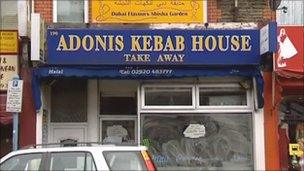E. coli: Cardiff takeaway 'inspected last month'
- Published

This Cardiff kebab takeaway in City Road, Roath, has been closed as a precaution
A kebab house at the centre of an E. coli outbreak was inspected less than a month ago, it has emerged.
Cardiff Council, which closed Adonis Kebab House in Roath, as a precaution, said it was rated as one out of five under the food hygiene scheme.
Two people have been discharged from hospital, but a third remains and is seriously ill.
The Conservatives called for food outlets to be forced to display hygiene ratings.
The Welsh Government said Wales would be the first UK country to introduce a mandatory food hygiene rating scheme.
Cardiff council last week closed the kebab house in City Road as a precaution.
It has now been revealed it was given a full inspection on 22 July and was rated as one out of five under the food hygiene scheme.
A Cardiff Council spokesperson said: "The current food business operator at Adonis has not been subject to any legal proceedings previously for poor food hygiene."
The spokesperson said after the full inspection, under the scheme, "a certain time scale" has to be given before publication of the rating to allow the opportunity for any appeal.
"The rating is due to be uploaded to the Food Standards Agency website by the 28 August," the council added.
Seven cases were originally confirmed by Public Health Wales, which is investigating along with Cardiff, Rhonda Cynon Taf and Vale of Glamorgan councils.
Only one case is under investigation.
Dr Gwen Lowe, consultant in communicable disease control, urged anyone who had eaten there since Monday 18 July to help the investigation by sending their details via a form on the Public Health Wales website: www.publichealthwales.org
A multi-agency outbreak control team has been set up to lead the investigation.
Public Health Wales had warned earlier that the number of cases could increase, but it said on Monday afternoon no more had been identified so far.
Since October 2010, council inspections of firms serving, selling or preparing food have been used to calculate a rating of between zero and five, with zero the lowest.
It is not compulsory for firms to display their ratings but Assembly Tory leader Andrew RT Davies, a South Wales Central AM, said it should be.
He added: "This latest outbreak is proof, if proof were needed, that we need to introduce a 'scores on the doors' system which would shame owners into action, or, at the very least, give consumers all of the information they need to make a decision."
A 2005 outbreak also led to an inquiry headed by Prof Hugh Pennington, a microbiologist, who called for more resources to go into food safety.
Mr Davies said that despite Prof Pennington's recommendations the Welsh Government had been slow to act on introducing legislation on food safety.
A spokesman said the Welsh Government "utterly refuted" the accusation that it had not taken action in responding to Prof Pennington's inquiry.
"There was no recommendation by Professor Pennington to introduce 'scores on the doors'," said the spokesman.
"However, the first minister has been clear that we will bring forward a draft food hygiene rating scheme bill for consultation at the end of this year and work has already started on this."
The spokesman said Wales would be the first country in the UK to introduce a mandatory food hygiene rating scheme.
E. coli O157 is a serious bacterial infection whose symptoms range from mild diarrhoea, stomach cramps and fever to bloody diarrhoea.
Experts say most people recover without complications, but the most severe cases can develop kidney failure.
Anyone experiencing symptoms of E. coli is asked to contact their GP or NHS Direct Wales on 0845 4647 for advice.
- Published15 August 2011
- Published13 August 2011
- Published22 March 2011
- Published12 August 2011
- Published3 October 2010